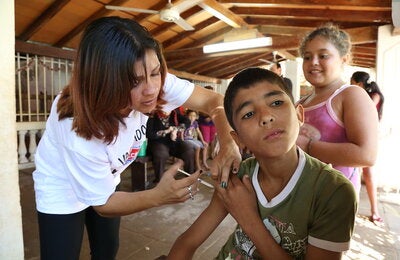
Washington, D.C., 25 October 2021 (PAHO) - The Pan American Health Organization (PAHO) collaborates with the countries of the Region to develop regulatory strategies and activities that facilitate progress in the control of antimicrobial dispensing, taking into account the situation in each country.
Regulations in some countries have been successful in controlling the dispensing of these medicines. For example, in 2015, El Salvador began requiring a medical prescription for ceftriaxone, imipenem, gentamicin, penicillin b, and amikacin for parenteral use, achieving a roughly 42% reduction in the sale of these antibiotics (1). In 2018, this measure was extended to other antibiotics for oral use: cefixime, azithromycin, clarithromycin, levofloxacin, moxifloxacin, and norfloxacin.
In 2018, Paraguay required that a simple prescription be on file to dispense antibiotics for parenteral use, achieving an approximately 30% reduction in the sales of antibiotics for systemic use.
These regulatory measures have been accompanied by public awareness campaigns and verification in pharmacies, leading to operational oversight.
Within the framework of these initiatives, a draft checklist for pharmacy inspections was prepared in consultation with the countries and evaluated by pharmacy experts in Chile to assess its feasibility.
This checklist is designed to further proper dispensing of antimicrobials. It includes the following elements to evaluate good practices, inventory, medical prescription, dispensing, training, and notification of any problems associated with medicines to the health authority.
The checklist will be piloted in pharmacies in Cuba, Panama, Paraguay, and Peru in the next six months.
As part of the action taken to assist countries in this effort, strategies and operational elements have been identified to support effective control, among them: (1) having a specific complementary regulation to control dispensing in this pharmacological class, (2) requiring an on-file medical prescription to dispense antimicrobials, (3) having mechanisms for monitoring both prescriptions and dispensing records in pharmacies, (4) specifying the information that prescriptions must contain and the expiration date for dispensing, (5) gradually implementing the measures by stages, based on established criteria – for example, parenteral antimicrobials, followed by oral antimicrobials, antimicrobials from the “watch” and “reserve” groups of the WHO AWaRe classification, and the most-used antimicrobials, according to the country’s epidemiological profile. Implementation of the activity is strengthened by creating a technical committee to combat antimicrobial resistance that addresses the issue of oversight and by the inclusion of the topic in discussions on national plans.
These initiatives are part of the Project Working Together to Fight Antimicrobial Resistance, part of the One Health approach implemented under the leadership of PAHO/WHO in close collaboration with the Food and Agriculture Organization of the United Nations (FAO) and the World Organisation for Animal Health (OIE), with funding from the European Union (EU).
(1) National Directorate of Medicines, El Salvador (2019).



